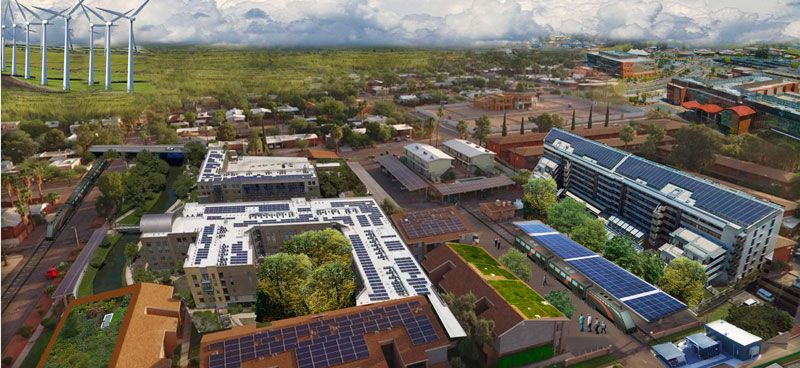| | Community Energy Resilience Update |
|
|
| |  | The Climate Center’s Community Energy Resilience (CER) initiative is working to create a new electricity system for California which is clean, affordable, reliable, equitable and safe -- prioritizing microgrid and distributed energy resource development in vulnerable communities that suffer the most from air pollution and power outages. If you wish to subscribe or unsubscribe, click here. |
|
|
| | April 19th Hearing Scheduled for SB 99, The Community Energy Resiliency Act On Monday April 19th, the Senate Energy Committee will hold a hearing to consider approval of SB 99, the Community Energy Resilience Act, authored by Senator Bill Dodd. Sponsored by The Climate Center, SB 99 directs the California Energy Commission to create a technical assistance and grant program to support local governments in creating community energy resilience plans that will outline the strategy that each local government will use to maintain a reliable supply of electricity: a necessary planning step that will make it possible to utilize new federal, state, and private funds for needed build-out of local energy resilience infrastructure. SB 99 prioritizes support for vulnerable communities that suffer most from air pollution and power outages. To learn more about the bill or express support for the bill, see the Community Energy Resilience webpage. |
| Save the Date: May 12th Launch of Community Energy Resilience Policy Update and Community of Practice Webinar Series On Wednesday, May 12th from 10 – 11:30 AM, The Climate Center will host a webinar focused on how local communities can start planning to take advantage of expected future state and federal resources to support community energy resilience. In a January 2021 Decision, the CPUC created a new $200M Microgrid Incentive Program for which funds will be available in 2022. On a federal level, FEMA already has it’s $500M BRIC program, and the Biden Administration has recently proposed a new trillion dollar infrastructure plan. The webinar will be the first in a series of “community of practice” sessions focused on project implementation in California. Speakers will include Tanya Barham from Community Energy Labs and Kate Ringness from SmartBlock Communities. The webinar series should be attended by local government officials, staff, community-based organizations and others looking for resources and support in identifying and advancing clean energy resiliency projects. May 12th will be the first of a series of webinars focused on project implementation. If you received this Update, you will receive registration information in a future update email. |
| April 23rd Deadline for Hosting California Climate Action Corps Summer Fellows The California Climate Action Corps is looking for partners with climate project needs who want to host AmeriCorps Fellows this summer. The priority deadline for Host Partner applications is April 23. Public agencies, Native American Tribes, and non-profit organizations throughout California can apply for 2-7 Fellows to support climate projects in and for frontline communities that include or combine the following elements: - Defined and measurable climate pollution reduction mitigation or resiliency adaptation benefits (e.g., projected GHG reductions, wildfire risk reduction, flood protection, increased green space, etc.).
- Volunteer coordination and engagement to provide service activities for community members.
- Climate education focused on building awareness and engagement with climate issues among community members.
Fellows will spend approximately 250 hours on project implementation over two months. Click here for information about becoming a Climate Action Corps Host Partner. |
| Building the Grid of the Future in California During The Climate Center’s March 24th webinar on community energy resilience policy, Lorenzo Kristov called for urgent action to create the grid of the future for California: climate and ecosystem disruptions are already severe and are rapidly getting worse, these impacts fall most heavily on vulnerable communities, and existing energy systems are a major cause of disruption. California needs to pursue three major goals in parallel and with urgency: converting to sustainable energy, enhancing resilience, and prioritizing environmental and social justice including a just energy transition. Achieving these goals will require local government action and new state policy initiatives, including SB 99, to enable local governments to decarbonize through local planning, enhance resilience with local electricity systems and microgrids, and ensure that the resilience, health, and economic benefits of local clean energy reach all communities. We need to evolve our electrical system from a centralized kilowatt delivery system to a decentralized “bimodal” structure with a vibrant network of distributed energy resources, with any customer able to generate and store electricity locally and manage on-site electricity load. To learn more about this vision for a “top-down-meets-bottom-up energy transition,” see the recording from the webinar: Creating Climate Resilient Communities--What WIll It Take? Lorenzo’s presentation is from 6:23 to 16:25 on the webinar recording. |
|
|
| The Climate Center
1275 - 4th St. #191 | Santa Rosa, California 95404
707-525-1665 | info@theclimatecenter.org |
|
|
| |
|
|